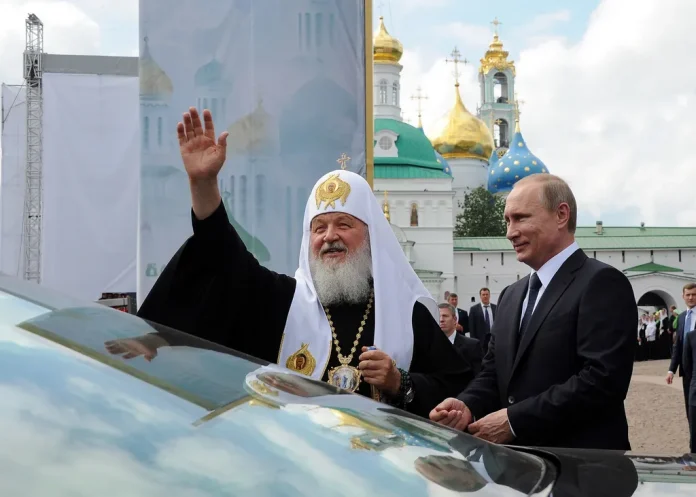Στο επίσημο Ρωμαιοκαθολικό περιοδικό της Γαλλίας LA CROIX, στο τεύχος της 29ης Μαΐου 2024, δημοσιεύτηκε ένα σημαντικό άρθρο της Malo Tresca για την εισβολή του Πατριαρχείου Μόσχας στην Αφρικανική ήπειρο τα τελευταία χρόνια.
Η αρθρογράφος εκτιμά ότι καθώς η επιρροή του μειώνεται στο πρώην σοβιετικό μπλοκ και με φόντο τον πόλεμο στην Ουκρανία, το Πατριαρχείο Μόσχας επικεντρώνει την επιρροή του σε ολόκληρη την Αφρική. Αυτή η φιλόδοξη στρατηγική είναι μέρος μιας ευρύτερης γεωπολιτικής επίθεσης από το Κρεμλίνο.
Στο κείμενο περιλαμβάνονται και δηλώσεις του Σεβ. Μητροπολίτου Καμερούν κ. Γρηγορίου, ιεράρχου του Πατριαρχείου Αλεξανδρείας και πάσης Αφρικής, ο οποίος γνωρίζει πολύ καλά τόσο τον χριστιανισμό στην Αφρική όσο και τις μεθόδους επιρροής του Πατριαρχείου Μόσχας.
Παραθέτουμε το άρθρο στα γαλλικά και στα αγγλικά.
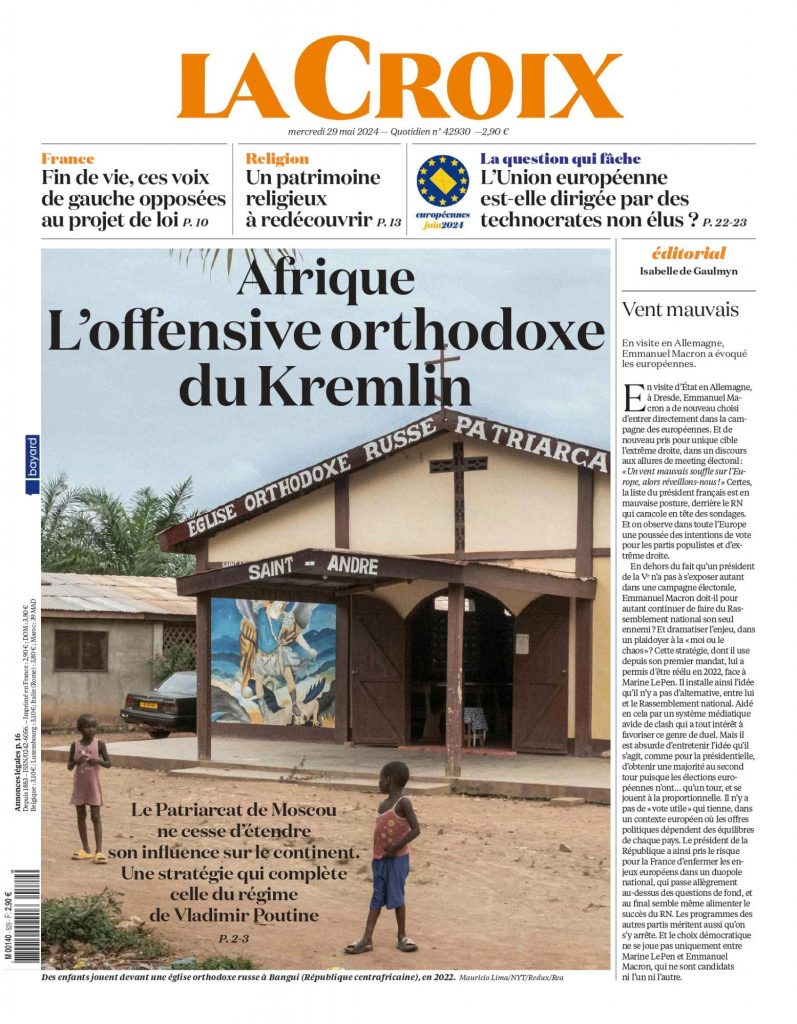
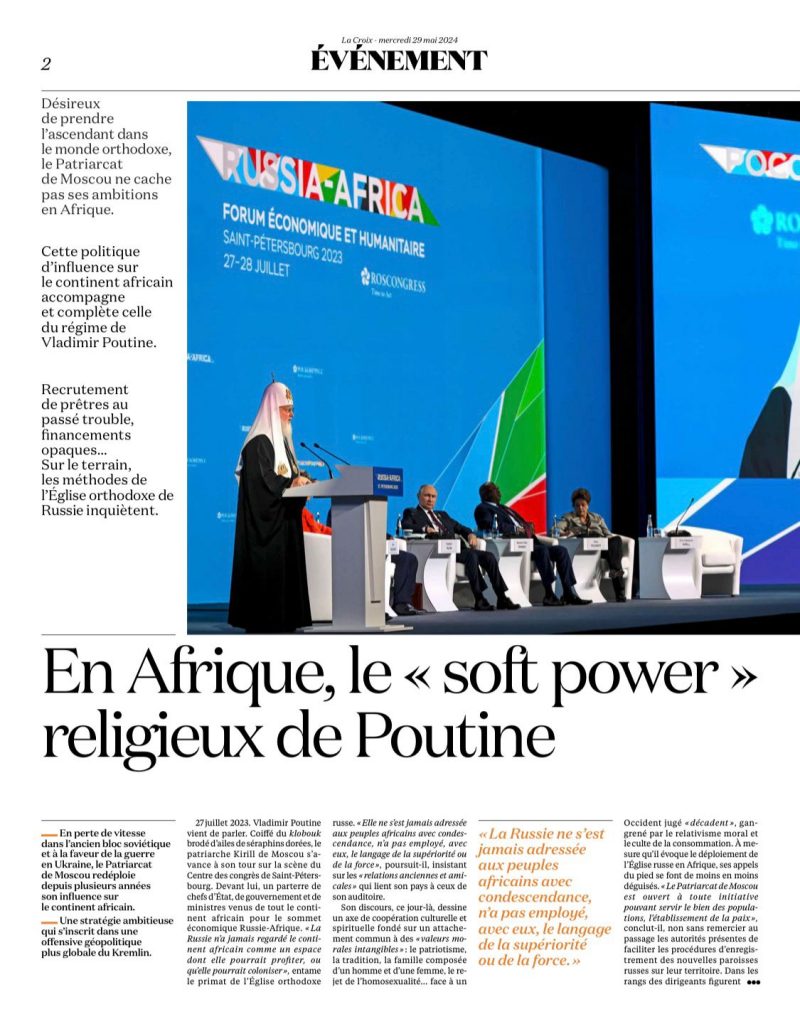
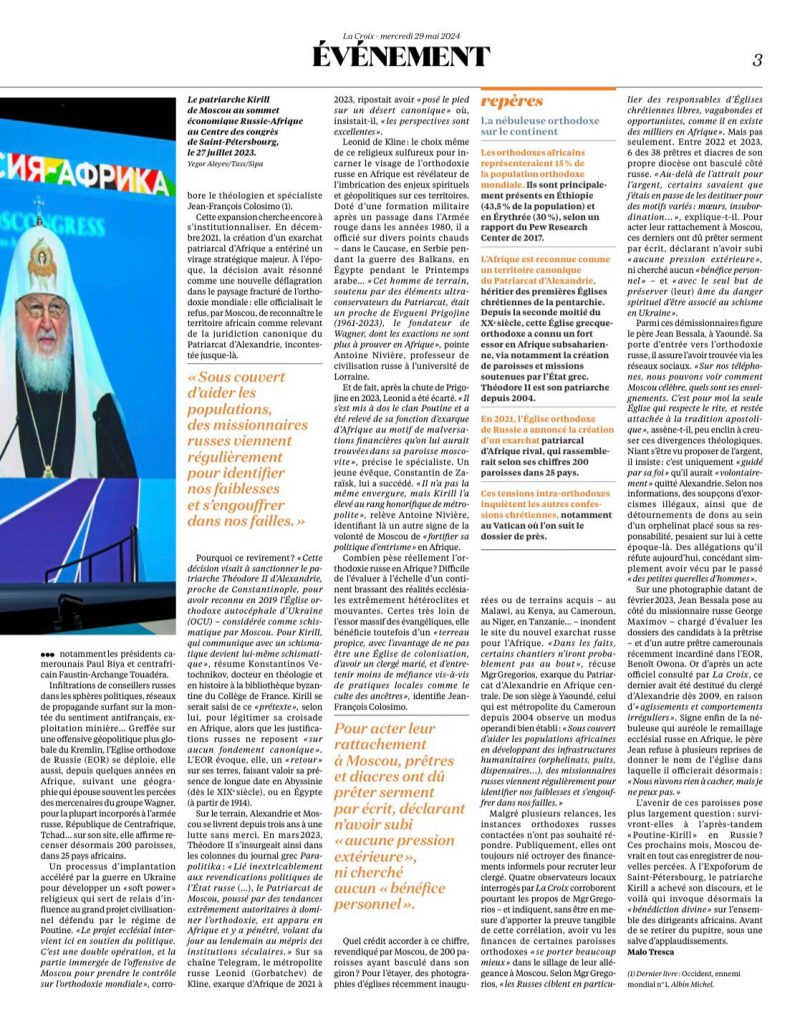
Putin’s Orthodox crusade in Africa
As its influence wanes in the former Soviet bloc and with the backdrop of the war in Ukraine, the Moscow Patriarchate has been redeploying its influence across Africa. This ambitious strategy is part of a broader geopolitical offensive by the Kremlin.
July 27, 2023: Russian President Vladimir Putin had spoken. Clad in a klobouk embroidered with golden seraphim wings, Moscow Patriarch Kirill stepped onto the stage at the St. Petersburg Convention Center. In front of him were heads of state, government officials, and ministers from across Africa for the Russia-Africa Economic Summit.
“Russia has never viewed the African continent as a space to exploit or colonize,” began the leader of the Russian Orthodox Church. “It has never spoken to African peoples with condescension, nor used the language of superiority or force,” he continued, emphasizing the “old and friendly relations” between his country and those in the audience.
His speech outlined a cultural and spiritual cooperation based on a shared attachment to “immutable moral values”: patriotism, tradition, the family of a man and a woman, and the rejection of homosexuality. This contrasted with a “decadent” West, riddled with moral relativism and consumerism. As he discussed the deployment of the Russian Church in Africa, his overtures became increasingly explicit. “The Moscow Patriarchate is open to any initiative that serves the well-being of the people and establishes peace,” he concluded, thanking the present authorities for facilitating the registration of new Russian parishes in their countries. Among the leaders present during the speech were Cameroon’s President Paul Biya and the Central African Republic’s President Faustin-Archange Touadéra.
Infiltrations of Russian advisors into political spheres, propaganda networks riding the wave of anti-French sentiment, and mining exploitation are part of a broader Kremlin geopolitical offensive. The Russian Orthodox Church (ROC) has also expanded in Africa for several years, often following the routes of Wagner Group mercenaries, many of whom are integrated into the Russian army. On its website, the ROC claimed 200 parishes across 25 African countries, including the Central African Republic and Chad.
This expansion, accelerated by the war in Ukraine, aimed to develop a religious “soft power” that supports Putin’s broader civilizational project. “The ecclesial project here supports the political one. It’s a dual operation, and the submerged part of Moscow’s offensive to control global Orthodoxy,” confirmed theologian and specialist Jean-François Colosimo.
“No canonical justification”
This expansion is still seeking institutionalization. In December 2021, the creation of a patriarchal exarchate for Africa marked a major strategic shift. At the time, the decision resonated like a new explosion in the fractured landscape of global Orthodoxy: it formalized Moscow’s refusal to recognize Africa as under the canonical jurisdiction of the Patriarchate of Alexandria, which was undisputed until then.
Why this reversal? “This decision aimed to sanction Patriarch Theodore II of Alexandria, (who remains) close with Constantinople, for recognizing the autocephalous Orthodox Church of Ukraine (OCU) in 2019 – considered schismatic by Moscow. For Kirill, anyone who communicates with a schismatic becomes a schismatic himself,” explained Konstantinos Vetochnikov, a doctor of theology and history at the Byzantine Library of the Collège de France. According to him, Kirill seized on this “pretext” to legitimize his crusade in Africa, even though Russian justifications rest “on no canonical basis.” The ROC, for its part, speaks of a “return” to its lands, citing its long-standing presence in Abyssinia (since the 19th century) and Egypt (since 1914).
Alexandria and Moscow have been in a fierce battle on the ground for three years. In March 2023, Theodore II denounced in the Greek newspaper Parapolitika: “Inextricably linked to the political claims of the Russian state, the Moscow Patriarchate, driven by extremely authoritarian tendencies to dominate Orthodoxy, has appeared in Africa, penetrating and defying centuries-old institutions overnight.” On his Telegram channel, Russian Metropolitan Leonid (Gorbachov) of Kline, Africa’s exarch from 2021 to 2023, retorted that he had “set foot on a canonical desert” where “the prospects are excellent.”
Leonid, a close associate of Wagner
Leonid of Kline: the choice of this controversial figure to represent Russian Orthodoxy in Africa revealed the intertwining of spiritual and geopolitical stakes in these territories. With military training and a stint in the Red Army in the 1980s, he served in various hotspots – the Caucasus, Serbia during the Balkan wars, and Egypt during the Arab Spring. “This field man, supported by ultra-conservative elements of the Patriarchate, was close to Yevgeny Prigozhin (1961-2023), the founder of Wagner, whose atrocities in Africa are well-documented,” noted Antoine Nivière, a professor of Russian civilization at the University of Lorraine.
After Prigozhin’s fall in 2023, Leonid was sidelined. “He fell out with the Putin clan and was removed from his position as Africa’s exarch due to alleged financial malfeasance in his Moscow parish,” the specialist clarified. A young bishop, Constantine of Zaraïsk, succeeded him. “He does not have the same stature, but Kirill elevated him to the honorary rank of metropolitan,” observed Antoine Nivière, identifying another sign of Moscow’s desire to “strengthen its policy of infiltration” in Africa.
Shifting realities
How significant is Russian Orthodoxy in Africa? It’s difficult to assess on a continent with extremely diverse and shifting ecclesial realities. While far from the massive growth of evangelicals, it benefits from a “favorable environment, with the advantage of not being a colonial church, having a married clergy, and being less suspicious of local practices like ancestor worship,” noted Colosimo.
How credible is Moscow’s claim of 200 parishes? To support it, photos of recently inaugurated churches and acquired lands – in Malawi, Kenya, Cameroon, Niger, and Tanzania – flood the new Russian exarchate’s website for Africa. “In reality, some projects will probably never be completed,” counterd Archbishop Gregorios, exarch of the Patriarchate of Alexandria in Central Africa. From his seat in Yaoundé, he observed a well-established modus operandi: “Under the guise of helping African populations by developing humanitarian infrastructure (orphanages, wells, clinics), Russian missionaries regularly come to identify our weaknesses and exploit our gaps.”
Despite several follow-ups, the Russian Orthodox authorities declined to comment. Publicly, they have always denied offering informal funds to recruit their clergy. However, four local observers interviewed by La Croix corroborated Archbishop Gregorios’ statements – and indicated, without providing evidence, that the finances of some Orthodox parishes have “improved significantly” following their allegiance to Moscow.
Recruitment criteria?
According to Archbishop Gregorios, “the Russians specifically target leaders of free, wandering, and opportunistic Christian churches, of which there are thousands in Africa.” But not only them as, between 2022 and 2023, 6 of the 38 priests and deacons in his diocese switched to the Russian side. “Beyond the lure of money, some knew I was about to dismiss them for various reasons: conduct, insubordination,” he explained. To formalize their attachment to Moscow, they had to swear in writing that they had not faced “any external pressure,” sought no “personal benefit,” and did so “solely to save their soul from the spiritual danger of being associated with the schism in Ukraine.”
Among these defectors is Father Jean Bessala in Yaoundé. He claimed his gateway to Russian Orthodoxy was through social media. “On our phones, we can see how Moscow celebrates its teachings. For me, it’s the only church that respects the rite and remains attached to apostolic tradition,” he asserted while reluctant to delve into theological differences.
Denying he was offered money, he insisted it was solely “guided by his faith” that he “voluntarily” left Alexandria. According to our information, suspicions of illegal exorcisms and misappropriation of donations at an orphanage under his responsibility weighed on him at the time. He denied those allegations today, conceding only to having experienced “small human quarrels” in the past.
In a photograph from February 2023, Jean Bessala posed with Russian missionary George Maximov – tasked with evaluating priesthood candidates – and another recently inducted Cameroonian priest, Benoît Owona. According to an official document consulted by La Croix, the latter was dismissed from Alexandria’s clergy in 2009 for “irregular actions and behaviors.” Finally, indicative of the nebulous nature surrounding the Russian ecclesial network in Africa, Father Jean repeatedly refuses to name the church he now serves: “We have nothing to hide, but I cannot.”
The future of these parishes is a broader question: will they survive the post-Putin-Kirill era in Russia? In the coming months, Moscow is expected to make further inroads. At the Expoforum in St. Petersburg, Patriarch Kirill concluded his speech by invoking the “divine blessing” on all African leaders before stepping away amid a round of applause.
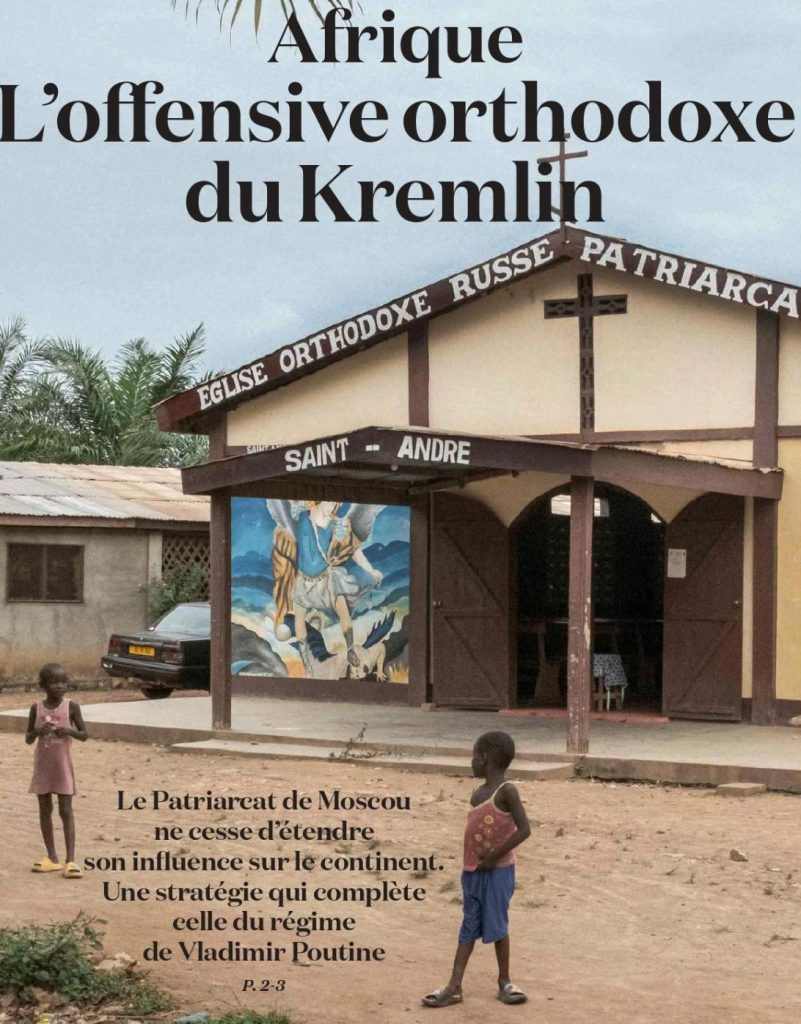
The Orthodox nebula on the African continent
According to a 2017 Pew Research Center report, African Orthodox Christians are estimated to make up 15% of the global Orthodox population. They are primarily found in Ethiopia, where they constitute 43.5% of the population, and Eritrea, where they make up 30%.
Africa is recognized as the canonical territory of the Patriarchate of Alexandria, which is the heir to the early Christian churches of the Pentarchy. Since the latter half of the 20th century, this Greek Orthodox Church has experienced significant growth in sub-Saharan Africa, notably through establishing parishes and missions supported by the Greek state. Theodore II has been its patriarch since 2004.
In 2021, the Russian Orthodox Church announced the creation of a rival patriarchal exarchate for Africa, which, according to its figures, comprises 200 parishes in 25 countries. These intra-Orthodox tensions are causing concern among other Christian denominations, particularly at the Vatican, where the issue is closely monitored.

